Participatory Village Land Use Planning in Tanzania
16 June 2023
Capacity development is a critical cross-cutting theme of all RFS projects, focusing on introducing, strengthening and maintaining the capabilities of people, institutions and local organisations to develop resilient food systems within their communities. Within the RFS programme, the development of rural extension services and capacities of agricultural extension officers is essential to this process.
Sub-Saharan Africa is home to 60 percent of the world’s remaining uncultivated arable land, yet the continent’s agricultural potential remains untapped. Over 60 percent of Africa’s population relies on agriculture for employment, most of which are smallholder farmers operating on less than 5 hectares of land. These smallholder farms are characterised by low levels of productivity, constrained by a lack of irrigation, quality inputs, access to credit, mechanisation, and storage facilities. Moreover, participation in farmer extension and capacity development programmes is low and declining, further restricting the capacity of smallholder farmers to adopt good agricultural practices.
Without access or exposure to information and skills for yield-enhancing techniques and technologies, smallholder farmers often resort to unsustainable agricultural practices, which further degrade available natural resources, leading to declining agricultural yields. This dynamic traps smallholder farmers in a cycle of low productivity and leads to a worsening of poverty and food security in rural communities.
Capacity development and rural extension activities introduce RFS farmers to new techniques and approaches for sustainable food production and sustainable land management. Sharing lessons on effective farming techniques, innovative agricultural methods, market needs, and sustainability issues, such as land degradation and deforestation, will help smallholder farmers identify areas that are constraining production and implement best practices to sustainably optimise use of the available natural resources.
RFS projects are also focusing on the training of agricultural extension officers in order to broaden the scope of extension service. Beyond new agricultural techniques and technologies, RFS adopts a more holistic approach to rural extension development, incorporating SLM and IWRM approaches, introducing off-farm incoming generation activities, enabling farmers to mitigate and adapt to climate change, and enhancing women and youth access to new skills and technologies.
RFS extension interventions aim to move away from a top-down approach to learning towards a new paradigm, one that promotes a two-way exchange between extension officers and farmers and between farmers themselves. The RFS programme works to document and scale this learning approach across all 12 RFS country projects.
Rural extension & Capacity Development is a cross-cutting theme that is central to all RFS country projects. Capacity development activities are implemented across multiple levels, from farmer beneficiaries to extension officers to government platforms and institutions. Activities are wide-ranging, including the establishment of knowledge exchange platforms, facilitation of practical field exercises and hands-on learning, establishment of demonstration plots and Farmer Field Days, and the organisation of exchange visits both locally and regionally between country projects.
In Burundi, FAO is working closely with Farmer Field Schools to train farmers in land and water conservation techniques through hands-on group learning, knowledge exchange, and field visits. The RFS Ghana project is holding a series of annual training sessions to improve the capacities of public extension service providers, as well as lead farmers who provide farmer-to-farmer extension services. In Nigeria, Farmer Field Days are used to showcase the viability and benefits of Good Agricultura Practices with a focus on Sustainable Land Management and Climate-Smart Agriculture.
Explore the RFS Country Projects to see more examples of how RFS countries are implementing Rural Extension & Capacity Development activities.
Stories from the Field
Explore our stories from the field to learn more about how RFS country project teams are implementing activities related to the programmatic theme of Rural Extension & Capacity Development.
Relevant resources
We have a growing library of reports, briefs, case studies, media, tools and guidelines. Explore all resources related to Rural Extension & Capacity Development to get greater insight into our programme activities.
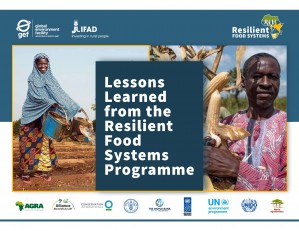
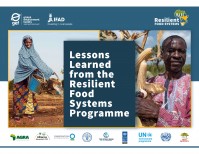
Integrated Approach Pilot (IAP) programmes were conceived as part of the Global Environment Facility (GEF) 2020 Strategy to test the delivery of integrated approaches that address discrete, timebound, complex, global environmental challenges. In its Sixth Replenishment Cycle (GEF6), three IAPs were funded: Sustainable Cities, Taking Deforestation out of Commodity Supply Chains, and Fostering Sustainability and Resilience for Food Security in Sub-Saharan Africa, also known as the Resilient Food Systems (RFS) programme.
The RFS programme serves as an outstanding example of different partners and countries with distinct mandates joining forces to pursue a shared objective, leveraging their respective strengths to transform food systems in Africa. It highlights the significance of clearly articulating the programme’s vision, establishing a well-defined division of labour, and delineating roles and responsibilities from the outset, forming the foundation for an accountability framework. Moreover, the RFS underscores the importance of adopting a nexus approach that integrates food security, agriculture, environment, socio-economic, and climate considerations.
This holistic approach recognizes the interconnectedness of these sectors and the need for holistic solutions. The RFS’s systems-based approach brings together multiple partners at different levels and fosters information flows in both directions, supporting collaboration and knowledge sharing.
This publication presents some of the main lessons learned from the RFS programme, which lasted for six years between 2017 and 2023. It provides a reflection on the implementation, lessons learned, and observations around the key components of the RFS. The programmatic value-add of the RFS and the manner with which it was harnessed during implementation is conveyed through case studies drawn from the experience of the country projects across these components.
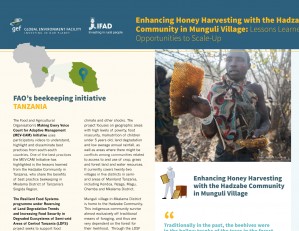
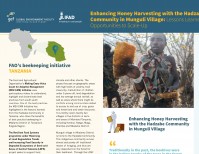
The Food and Agricultural Organisation’s Making Every Voice Count for Adaptive Management (MEV-CAM) Initiative uses participatory videos to understand, highlight and disseminate best practices from south-south countries. One of the best practices the MEV-CAM Initiative has highlighted is the lessons learned from the Hadzabe Community in Tanzania, who share the benefits of best practice beekeeping in the Mkalama District of Tanzania’s Singida Region.
The Resilient Food Systems programme under the Reversing of Land Degradation Trends and Increasing Food Security in Degraded Ecosystems of Semi-arid Areas of Central Tanzania (LDFS) project seeks to support food production and security in Tanzania. Through the LDSF project, the Hadzabe community have developed a land use and participatory plan of the forest.
This poster presents lessons learned and the process of adopting this best practice beekeeping from the Hadzabe community.
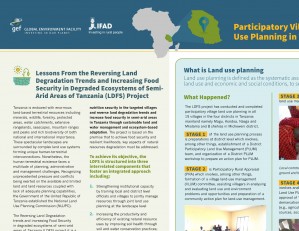
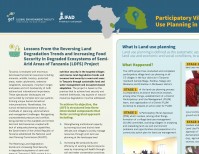
The Reversing Land Degradation trends and increasing Food Security in degraded ecosystems of semi-arid areas of Tanzania (LDFS) project is a pilot programme that will contribute to national, regional and global agendas. The Government of the United Republic of Tanzania facilitated an initiative that engages local people in creating participatory land use plans that reflect their contexts and needs. The RFS Tanzania project is piloting this approach on the ground in communities, and this poster presents emerging lessons from the project.